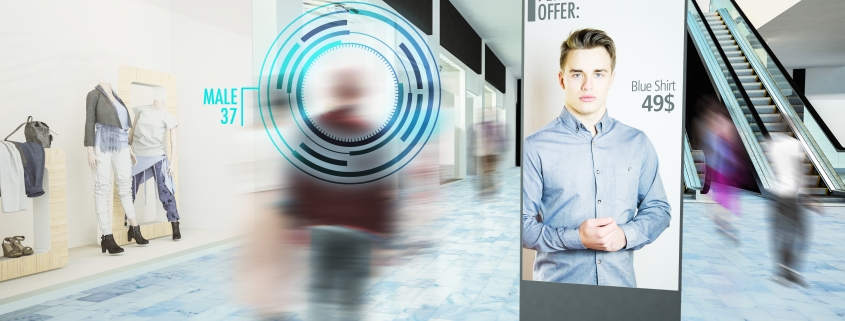Four Ways AI Improves the Customer Experience in Retail
Even in times where traditional brick and mortar shops are facing increasing competition from online shops, the real-world shopping experience is still relevant. Artificial intelligence (AI) is now being used to chart a customer experience journey that fits the demanding expectations of retail consumers.
Artificial Intelligence has become a key element in the digitalization of in-store retail by personalizing the customer experience and creating a more engaged business-to-consumer interaction. A recent study by IBM showed the adoption of AI-driven intelligent automation in the retail and consumer products industries is projected to leap from 40% of companies today to more than 80% in three years.
Here are four new benefits businesses can benefit from to boost customer engagement, experience and success by utilizing AI.
1. Personalization
The main game-changer in retail AI is personalizing the customer experience. The tech-savvy customer expects personalization and retailers are rising to the challenge with the help of AI, machine learning, and big data.
Online, AI uses advanced machine learning algorithms to analyze browser history, page clicks, social interactions (likes, shares), past purchases, the duration for which a page was viewed, location, etc. to gauge customer interests and preferences.
In-store, AI can further enrich the customer’s shopping experience with:
- Navigation: AI enabled robots or kiosks can now use natural language voice commands or touch screen interfaces to help customers locate products in the store.
- Smart checkouts: Companies like SmartCart have invented shopping carts with cameras that can automatically tally up user purchases, prepare an order, and enable payments through a mobile device.
- AI-driven AR: Many retail stores offer virtual trial rooms, make-up or product apps, which use AI-driven Augmented Reality interfaces to let customers test products without physically trying them on.
With no queues and checkouts the customer saves valuable time; It’s the ultimate in-store convenience.
2. Reducing Customer Friction
AI can help navigate the whole customer experience journey, and identify where friction points occur and where experience levels fall down.
Compared to a human, reading through endless transcripts, AI can easily find the most frequently asked question where customers aren’t getting the result they want. Businesses can then identify problems quickly and amend the customer journey appropriately. AI further reduces customer friction by:
- Enabling real-time customer engagement, as well as instant identification and remediation of service-level issues.
- Processing large-scale data, to understand and process customer feedback.
- Provides opportunity to improve and enhance these services, with more informed decision-making.
These pleasant-shopping enabling experiences are at the forefront of the big names such as Amazon. They recently opened Amazon Go in Seattle which takes shopping to a whole new level. It provides a checkout-free experience for its customers. There are no cashiers at all. Customers simply walk in, take what they like off the shelves and walk out; it’s as simple as that.
Many retailers are looking to replicate this concept, which will have massive benefits such as removing customer friction points (long queuing times, lack of cashiers) and minimizing labor costs.
3. Behind the Scenes
Creating a seamless customer experience starts behind the scenes. Making sure your customers have what they want is a sure way to get off to a good start, because no one wants to see what they came for “out-of-stock”.
Retailers are using advanced analytics and forecasting to accurately forecast and optimize inventory levels. Some are even looking at real-time tracking of inventory in stores and monitor which items are out of stock. The idea is to quickly replenish stock, thus massively improving the customer experience.
Robots are also being used to stock shelves optimally to ensure a pleasant customer experience.
4. Co-Piloting
While many fear Artificial Intelligence as a threat to human jobs, AI can assist live agents and employees to deliver a better customer experience.
According to LogMeIn’s 2018 AI Customer Experience report, 25% of a worker’s time is spent looking for relevant information to help a customer. By acting as the co-pilot, however, AI can gather information on the customer in real time, informing the staff member of who they are talking to, the customer’s history with the brand, their preferences, the potential problem the customer is having and how to solve it. Having this information during the interaction provides employees with more time to spend on resolving the issue.
So instead of hesitancy once faced with AI technology, once implemented, employees should embrace these new ways of working because it helps them do their job better, in an easier way.
Final Thoughts
Personalized retail with AI is redefining customer shopping trends. AI is helping deliver enhanced customer experiences by making better product suggestions, enabling faster checkouts, and facilitating more convenient in-person shopping. Artificial intelligence in customer service helps to understand customer concerns and expedite related processes.
In conclusion, AI in the retail industry will have a major impact on the customer experience across retails stores. It not only provides the link between the online and offline connection with the customers, it also helps enrich in-store experiences, increasing footfalls and customers will keep coming back for more.
Mystery Customer Research from BARE International
If you have customers, BARE International can help you.
Whether you call them customers, guests, patients, patrons, riders, fans or clients, BARE International can create a program to measure their experience interacting with your brand. Every 2 minutes, a BARE evaluation or audit is completed by our field force of more than 500,000 evaluators. Using calls, clicks or in-person visits, the common thread of our services is always revealing the moment of truth when your customers interact with your brand.
Businesses like yours come to us to find answers, and stay with BARE because we build relationships and custom, long-term solution programs. Our average client relationships last beyond 8 years, compared to an industry average of 2 years. This longevity allows us to really know and understand your business and its particular challenges.
Because your challenges are unique, our services can be customized to create just the right research program to address your needs. Contact a customer experience research expert at BARE to set up a complimentary evaluation of your business today.











